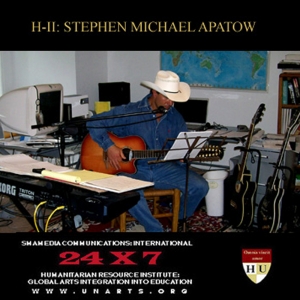5 November 2011 -
Updated January 2015
Humanitarian Resource Institute
Phone: (203) 668-0282
Url: www.humanitarian.net
United Nations Arts Initiative
Arts Integration Into
Education
Url: www.unarts.org
Twitter: unarts

Behind The Music: Country Goes Global -
133 Cities to 192 Countries
Two national youth leadership projects impacted hundreds of cities
across America, the first for substance abuse in 1990, in cooperation
with the National Clearinghouse for Drug and Alcohol Information (today
CSAP), and the second for community service in 1993, in cooperation
with the U.S. House Select Committee on Hunger and twenty national
organizations. [1] Efforts to address the vast unmet needs
revealed during these projects, led to the formation of the nonprofit
organization Humanitarian Resource Institute (HRI) [2] in 1994.
As an athlete, coach of arts, sports and Olympic development
programs and graduate of the Nutmeg Conservatory for the Arts
Professional
Program, [3,4] Stephen Michael Apatow [5] had an interest in connecting
with a broader spectrum of youth. Both projects encompassed a
daily
physical challenge, combined with speaking engagements, town meetings
and press conferences in hundreds of cities across America.
Today,
the many challenges and lessons learned, are the focus of his U.S. and
international leadership initiatives. The importance of this
discussion relates to the current spectrum of challenges facing
communities across America today, and in 192 United Nations member
countries, that are striving to recover from
the most severe economic downturn since the Great Depression.
Before forming HRI, while on return flight to the West Coast, Stephen
was fortunate enough to sit next to one of the attorneys from the Nixon
Library. When asked what guidance, this legal council had,
regarding the formation of HRI, his advice was direct and pointed,
"keep
your board small and mission focused." He noted the nightmare
associated
with too many board members, many with their own agendas, leaving
little
room for progress.
The next person who significantly impacted the development of HRI was
mentor Dr. Ralph Swisher, Director of the Community and Family
Preparedness program at the Federal Emergency Management Agency (FEMA),
formerly with the Department of Justice and member of the National
Association of Scholars. His advice was also direct and pointed,
"As the
executive director, don't focus on fundraising and grants as your
primary
operational task, keep your focus on the mission of the organization."
During the 1993 Community Service Project, the focus in 133
cities from Washington, DC to San Francisco California was to provide
a platform for executive directors of front line service programs, so
they could share about the size and scope of needs in their area. This
mission focus was to "Bridge Unmet Needs to Untapped Resources," to
assist
strategic planning and development of projects to fill any gaps.
The tragedy, in many cases, was that communication,
in our advanced technological age, was the single variable that
stood between, the unmet needs in those communities and a public
response.
The first major project of HRI was named "Focus On America," and with
the help of FEMA, HRI was able to network to the directors of
the Emergency Food and Shelter National Board Programs in approximately
3000 counties, in all 50 states. The objective of the project was
to establish an Unmet Needs Coordinator in each city, who would
(1) serve as a contact point for all front line service programs, (2)
establish an email and fax communication network that would reach
all churches, youth leadership programs, central school districts,
businesses, corporations and the media in that area and (3) communicate
quarterly unmet needs reports.
Though effectively networked, HRI soon learned that there was
resistance against the mission objectives of the project. The
first came from churches, while working with the national leaders of
interfaith organizations, who were asked to help communicate
information on the
project down to the grassroots level. The challenge, "there
was no interest in the development of any communication network that
would
reach the constituencies of the local churches, that was outside of
their
control," even if they were regarding the unmet needs in those
communities.
In time, umbrella organizations for nonprofits and community
leaders
shared the same sentiment. On the nonprofit level, HRI learned
that
threats, regarding funding, were even held over the heads of numerous
executive
directors of frontline programs, who considered participation with the
initiative. Understanding the scope of political challenges and
agendas, behind the scenes, encompasses the type of support system
needed for the development of humanitarian initiatives, today.
2010 marked 20 years of dedication to humanitarian relief efforts and
policy development by Stephen Michael Apatow, though around the
year 2000, his interest once again refocused on the arts, music,
composition and production. In the late 2000's, he expanded these
efforts
as an artist/publisher with American Society of Composers, Authors and
Publishers (ASCAP) as an artist member of the Country Music
Association.
It was from this transition that the HRI "Arts Integration Into
Education"
focus evolved, leading to the development of the United Nations Arts
Initiative.
[6] The focus, utilizing artists, who have the innovation,
creativity
and a connection with the grassroots level as the bridge, to lead U.S.
and international humanitarian relief efforts and policy
development.
Reflecting upon "the cost of putting your life on
the line to help the needy, rich and poor," the lead soundtrack is
"The American Way," and in dedication to the troops, the compilation
includes "Special Forces Prayer" and "The Soldiers Tear."
References:
1. Tour de America: Url: www.tourdeamerica.com
2. Humanitarian Resource Institute: Url: www.humanitarian.net
3. Nutmeg Conservatory for the Arts: Url: www.nutmegconservatory.org
4. International Dancescience Development Program: Url: www.edancescience.org
5. Stephen Michael Apatow: Founder, Director of Research and
Development for Humanitarian Resource Institute and the United
Nations Arts Initiative. Url: www.apatow.org
6. HRI: United
Nations Arts Initiative: Url: www.unarts.org
|